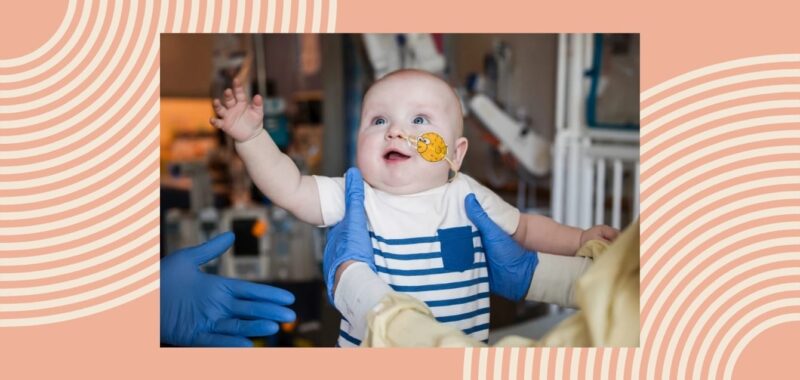When Nicole Muldoon and her husband Kyle learned their newborn son KJ had a deadly genetic condition, they were faced with an unimaginable choice: opt for a traditional but invasive liver transplant, or take a leap of faith on an experimental gene therapy that had never been used in a human before.
As first reported by NBC News, the Muldoons chose the unknown. That decision not only saved their son’s life—it may open a door to a future where rare diseases don’t mean hopeless outcomes for other families.
Now, baby KJ is growing, thriving, and rewriting what’s possible for personalized medicine.
What is CPS1 deficiency and why it’s so dangerous
KJ was born with a rare condition called CPS1 deficiency, which affects approximately one in a million babies. It’s caused by a genetic mutation that prevents the body from removing ammonia from the blood. If untreated, that ammonia builds up quickly—and can become toxic or even fatal.
For many children, the only current option is a liver transplant. But transplants come with significant risks, including lifelong medication, rejection, and complications.
Related: To the mom raising a child with a rare disease—I see you
The choice that made medical history
In a matter of months, doctors at Children’s Hospital of Philadelphia and Penn Medicine—along with academic partners—developed a personalized gene therapy designed specifically for KJ. It was a race against time, and the stakes couldn’t have been higher.
They used a cutting-edge gene editing technique known as base editing, a safer, more precise evolution of CRISPR. Rather than cutting DNA, it corrects a single “letter” in the genetic code—reducing the risk of unintended effects.
Dr. Kiran Musunuru, a leading expert and co-author of the study, said,
“This is the first step towards the use of gene editing therapies to treat a wide variety of rare genetic disorders for which there are currently no definitive medical treatments.”
A little boy’s big milestones
KJ received his first infusion in February. Tiny lipid nanoparticles delivered the gene-editing tool directly to his liver cells. Since then, he’s been able to eat more normally and recover from common colds without crisis—both major wins for a baby with CPS1.
And for Nicole and Kyle, even the smallest moments feel enormous.
“Any time we see even the smallest milestone that he’s meeting—like a little wave or rolling over—that’s a big moment for us,” Nicole said.
Why this moment matters far beyond one baby
Personalized gene therapies like KJ’s are groundbreaking not only for their success—but also for what they signal. Until now, rare diseases like CPS1 have often been overlooked because they’re not profitable to treat. Developing new therapies can cost millions, and drug companies tend to focus on conditions with broader markets.
But this case shows another path forward. Dr. Musunuru shared that the total cost of KJ’s therapy was “not far off” from the $800,000-plus typically spent on a liver transplant and care—suggesting that with better systems, these treatments could be feasible for more families.
“As we get better and better at making these therapies and shorten the time frame even more, economies of scale will kick in and I would expect the costs to come down.”
How gene therapy is changing the future of rare disease treatment
- Base editing is a newer version of CRISPR that “flips” a single base (the genetic building blocks A, T, C, G) rather than cutting DNA entirely—making it more accurate and safer.
- Personalized gene therapy is designed for a specific mutation in a single patient—but lessons from each treatment may benefit many others.
- Early successes like KJ’s could pave the way for faster, cheaper, and more equitable treatments for thousands of ultra-rare diseases.
Looking ahead—with hope
It’s still early days. KJ will be monitored for years to understand the full effects of his gene therapy. But for now, he’s eating, smiling, and hitting milestones that once felt impossible.
And his journey is lighting a path for other families, too.
Sometimes, motherhood means making impossible choices. Nicole Muldoon made hers with courage—and changed the world for more than just her baby.
Related: The loneliness of being a ‘special needs’ parent is real

